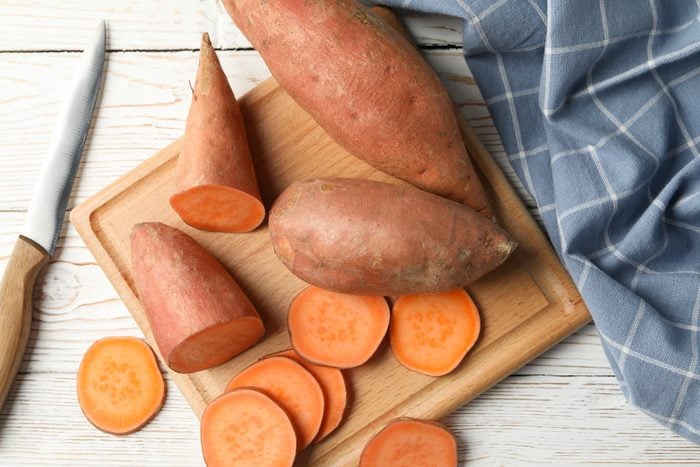Are Sweet Potatoes Good for People with Diabetes?
Updated: Nov. 17, 2023

Starchy vegetables seem like a no-no for people who want their blood sugar to be perfect. But sweet potatoes are a carbohydrate-rich food that people with diabetes don't need to fear.
Don’t skip out on sweet potatoes! You’re missing a great opportunity to give your body a boost of stay-healthy nutrients. If you’re mindful about how you eat them, these colorful tubers (did you know they come in yellow and purple, too?) can be an easy-to-prep side dish or a low-calorie, high-fiber ingredient in recipes.
Are Sweet Potatoes Healthy for People with Diabetes?
If you’re smart about how you eat them, sweet potatoes can be a good mealtime addition. That’s true even if you’ve been diagnosed with diabetes.
Many people with diabetes make the mistake of thinking all starchy foods are off limits. However, even the American Diabetes Association (ADA) encourages people to include at least some carbohydrates (along with protein and fat) in their diet for better blood sugar control.
Carbohydrates are the body’s main source of energy, so including a good source of this nutrient makes sense! For an energy-boosting benefit with the lowest blood sugar spike, choose complex carbohydrates, or carbs that are unprocessed and have fiber, vitamins and minerals intact.
Sweet potatoes are the perfect example of a carbohydrate that’s high-nutrient and low in sugar, sodium and saturated fat. It’s exactly what diabetes experts recommend fill up one-quarter of your plate at mealtimes.
Sweet Potato Nutrition Facts
Considering its bright orange insides, it won’t surprise you to know that sweet potatoes are loaded with beta-carotene, the same eyesight-protecting nutrient found in carrots. Sweet potatoes also have something in common with bananas: lots of potassium. That’s good news for people with diabetes since low levels of this mineral are linked with blood sugar dysfunction.
Those aren’t the only two nutritional perks. According to the USDA Nutrient Database, one 5-inch long sweet potato (uncooked and with skin on) contains the following nutrients:
- Calories: 112
- Fat: 0 grams
- Protein: 2 grams
- Total carbohydrate: 26 grams
- Fiber: 4 grams
- Sugar: 5 grams
- Sodium: 72 milligrams
- Potassium: 438 milligrams
- Folate: 14 µg
- Phosphorus: 61 milligrams
- Magnesium: 33 milligrams
- Beta-carotene: 11100 µg
- Vitamin A: 18500 IU
4 Ways to Eat Sweet Potatoes If You Have Diabetes
Be Modest When Shopping
Like most root vegetables, sweet potatoes can vary in size. Opting for medium to small potatoes (as opposed to those you can hardly fit in one hand) offers two benefits.
First, the smaller size will be more in-line with the amount the ADA recommends that you include as part of a meal for better blood sugar control. Second, as potatoes grow in size, they also grow older. That means the starch content is higher than what’s found in their younger, smaller counterparts.
If you need to meet a cup-by-cup amount for a recipe, choosing multiple petite potatoes may help your final dish have less of an impact on blood sugar!
Opt for Boiling Over Baking
When researchers compared different cooking methods of sweet potatoes, they found that baking this vegetable raised the glycemic index (the impact a food will have on blood sugar) more than boiling it. Gram for gram, baked sweet potato has almost 25% more carbohydrates than boiled versions.
Another option that’s better than baking: microwaving. Piece each sweet potato several times with a fork, then aim for 5 to 10 minutes in the microwave, depending on the size of your potato.
Snack on the Skins
The skins of potatoes pack a major part of their nutrients. To be specific, food scientists determined that 64% of a potato’s blood-sugar balancing fiber content can be found there! The good news: less prep work for you. Scrub the skins but skip peeling them.
Serve ‘Em As a Side
The best way to maximize the nutritional punch and ease the blood sugar rise is to pair sweet potatoes with a lean protein, such as chicken. Since protein slows down digestion, it will also slow down the speed at which your body processes the carbohydrates eaten alongside it.
You can make a meal even more filling by pairing the sweet potato and protein with other high-fiber, non-starchy vegetables, such as cauliflower. The perfect mix can be found in this easy-to-make Sheet-Pan Chicken Curry Dinner.
